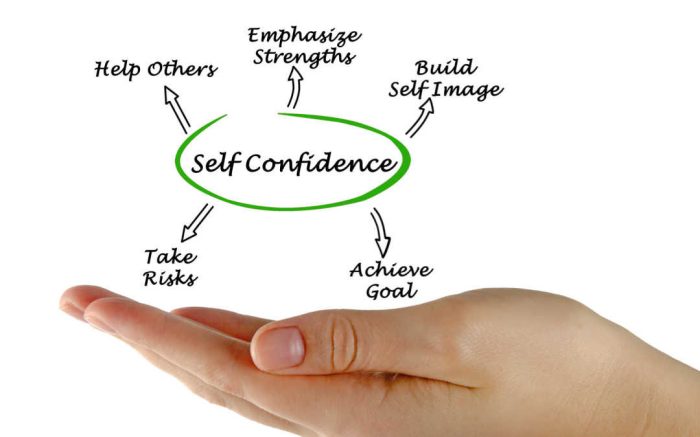Building Self-Confidence sets the stage for a journey towards unleashing your full potential, exuding charisma, and conquering self-doubt with style.
As we dive deeper, discover the secrets to embracing your uniqueness and stepping into your power with unwavering confidence.
Definition of Self-Confidence
Self-confidence in personal development refers to the belief in one’s abilities, skills, and judgment. It is the assurance in oneself to handle challenges, take risks, and pursue goals without being overly influenced by external factors.
Characteristics of a Person with High Self-Confidence
- Positive self-image: Individuals with high self-confidence have a strong sense of self-worth and value.
- Resilience: They bounce back quickly from setbacks and failures, viewing them as learning opportunities.
- Assertiveness: They can express their thoughts and opinions confidently without being aggressive.
- Openness to new experiences: They are willing to step out of their comfort zone and try new things.
Examples of How Self-Confidence Manifests in Everyday Life, Building Self-Confidence
- Public speaking: A confident person can speak in front of a large audience without feeling anxious or self-conscious.
- Job interviews: They can effectively showcase their skills and experiences, leaving a lasting impression on the interviewer.
- Social interactions: Confident individuals can engage in conversations with strangers, build rapport, and make new connections easily.
Importance of Building Self-Confidence
Building self-confidence is crucial for success in various aspects of life. When you believe in yourself, you are more likely to take on challenges, push yourself out of your comfort zone, and strive for your goals with determination.
Self-confidence can positively impact relationships by fostering better communication, trust, and respect. When you are confident in who you are, you are more likely to attract positive and healthy relationships into your life.
In terms of career, self-confidence can be a game-changer. It can help you stand out in interviews, take on leadership roles, and navigate through workplace challenges effectively. Employers are drawn to confident individuals who can handle pressure and uncertainty with grace.
Mental well-being is also closely tied to self-confidence. When you believe in yourself and your abilities, you are less likely to dwell on negative thoughts and self-doubt. This can lead to lower levels of stress, anxiety, and depression.
Self-confidence plays a significant role in overcoming challenges and setbacks. When you have a strong sense of self-belief, you are more resilient in the face of obstacles. You are better equipped to bounce back from failures, learn from your experiences, and keep moving forward towards your goals.
Strategies for Building Self-Confidence

Building self-confidence is crucial for personal growth and success. Here are some practical strategies individuals can implement to boost their self-esteem.
Setting Achievable Goals
Setting achievable goals is essential in enhancing self-esteem. When setting goals, it’s important to make them specific, measurable, attainable, relevant, and time-bound (SMART). By setting realistic goals and achieving them, individuals can build a sense of accomplishment and confidence in their abilities.
Self-Care and Self-Compassion
Self-care and self-compassion play a significant role in building self-confidence. Taking care of oneself physically, emotionally, and mentally can improve self-esteem. Engaging in activities that bring joy, practicing mindfulness, and being kind to oneself are all essential components of self-care. Additionally, practicing self-compassion involves treating oneself with understanding and forgiveness, rather than harsh self-criticism. By practicing self-care and self-compassion, individuals can cultivate a positive self-image and boost their confidence levels.
Overcoming Self-Doubt and Fears

Self-doubt and fears can be major roadblocks on the journey to building self-confidence. It’s crucial to develop techniques to overcome these obstacles and improve your self-esteem.
Reframing Negative Thoughts
One effective way to overcome self-doubt is by reframing negative thoughts and beliefs. Instead of focusing on what could go wrong, try to shift your perspective to what could go right. Replace self-critical thoughts with positive affirmations and reminders of past successes.
Managing Fear of Failure
The fear of failure can paralyze individuals and prevent them from taking risks or trying new things. To manage this fear, break down your goals into smaller, manageable tasks. Celebrate small victories along the way and see failures as opportunities for growth and learning.
Real-Life Examples
- Michael Jordan, widely regarded as one of the greatest basketball players of all time, was famously cut from his high school basketball team. Instead of letting this setback define him, Jordan used it as motivation to work harder and eventually became a six-time NBA champion.
- J.K. Rowling, author of the Harry Potter series, faced numerous rejections before finding success with her books. Despite setbacks and self-doubt, Rowling persevered and became one of the best-selling authors in the world.
- Oprah Winfrey, media mogul and philanthropist, overcame a difficult childhood and early career challenges to build a successful empire. By believing in herself and pushing past self-doubt, Winfrey became a household name and an inspiration to many.